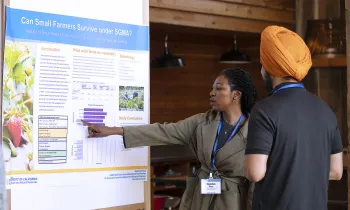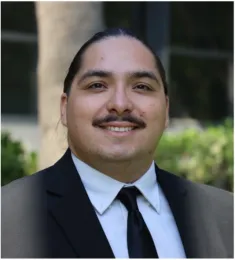California relies on groundwater - water stored in underground aquifers and pumped through wells - for up to 41% of water supply in normal years and up to 60% during times of drought. In 2014, the California legislature signed into law the Sustainable Groundwater Management Act (SGMA) with the primary goal of reducing groundwater use across the state. The historic passage of SGMA emphasized that groundwater management is best accomplished locally. Therefore, SGMA required the formation of local Groundwater Sustainability Agencies (GSAs), often consisting of water districts, irrigation districts, counties and cities coming together to develop and implement long-term Groundwater Sustainability Plans (GSPs) to achieve groundwater sustainability within a 20-year timeline as required by the law.

Importantly, SGMA calls for the consideration of the interest of all beneficial uses and users of groundwater. In 2022, UC ANR participated in a study with non-governmental organizations titled “Underrepresented farmers and SGMA” to assess the impact of SGMA on small-scale farmers. The study found that impacts or benefits of SGMA implementation to small-scale farmers had not been adequately considered. Recommendations from the study include provision of technical assistance to help small-scale farmers engage and comply with SGMA implementation.
Through funding from the State Legislature through California Department of Water Resources, Underrepresented Communities, California Tribes and Small Farmers Groundwater Technical Assistance (URCTA) Program, UC ANR has established a team of one statewide coordinator and five regional coordinators to provide technical assistance, extension education, policy analysis and outreach to small-scale farmers to understand how SGMA might impact them.
This team will assess the regional needs of small farmers in 11 counties across the San Joaquin Valley, Southern California and the Central Coast. Technical assistance will include connecting small-scale farmers to additional resources such as hydrogeological consulting services, legal services, and assistance with irrigation system analysis and water conservation. The regional coordinators will also engage with local GSAs, attend meetings, review GSPs, analyze local and regional groundwater management policies, and provide information on the impacts of local policy decisions.
Project activities will be coordinated with the UC ANR Small Farms Network as well as the Community Alliance with Family Farmers (CAFF) and other nonprofit and agency partner organizations.
Connect with the Small Farms SGMA Team
Meet the regional SGMA coordinators who are ready to help small-scale farmers throughout the state navigate SGMA.

Jarin Tasnim Anika serves Stanislaus, San Joaquin and Merced counties. Anika is currently completing her master's degree in horticulture and agronomy from UC Davis. Her research is focused on crop water use of cherries and the application of deficit irrigation strategies on cherry orchards in the Central Valley. She also holds a master's degree in environmental science and bachelor's degree in soil, water and environment from the University of Dhaka in Bangladesh. Anika is passionate about fostering community engagement and supporting small-scale farmers. She wants to integrate science-based knowledge and practical solutions to address the challenges faced by small-scale farmers in the region. Anika is based in Modesto and can be reached at janika@ucanr.edu.

Luis Paniagua serves Tulare and Kings counties. Paniagua has worked throughout California in grassroots, union and lobbying efforts that highlighted underrepresented communities as important stakeholders in decision making. He seeks to build partnerships that will bring resources to small-scale farmers during SGMA implementation. He is currently in his last year of a master's in public policy and administration from CSU Bakersfield and holds bachelor's degrees in interdisciplinary studies and Chicana/o studies from San Diego State University. Paniagua is based out of the UC Cooperative Extension Office in Tulare and can be reached at lcpaniagua@ucanr.edu.

Sonia Rios serves Riverside and San Bernardino Counties. Prior to rejoining UC ANR, Rios was the environmental manager at SeaWorld San Diego and also has been held positions with Bayer Crop Science, USDA Forest Service and California Department of Food and Agriculture. Rios previously worked for UC ANR for over 12 years. She first served as a staff research associate in Tulare and Kings counties for three years. She also served as the UCCE subtropical horticulture farm advisor in Riverside and San Diego counties for over eight years. As a farm advisor, she studied herbicide resistance, efficacy and crop phytotoxicity. She conducted a high-density trial in “Gem” avocados and collaborated with UCCE specialists and advisors in irrigation management and entomology studies in permanent tree crops. The National Association of County Agricultural Agents presented Rios with its Early Career Achievement Award in 2021. Rios is based at the UCCE office in Riverside and can be reached at sirios@ucanr.edu.

Erik Rodriguez serves Fresno and Madera counties. Rodriguez holds a master's degree in habitat management and ecological restoration from the University of Idaho and a bachelor's degree in natural resource management from Fresno State. He has worked in various aspects of agriculture. His experience includes hands-on farming on small farms and at Fresno State's Vegetable Crop Unit, conservation education at Fresno Chaffee Zoo, data collection for National Ecological Observatory Network in the Sierra Nevada mountains and soil conservation for USDA Natural Resources Conservation Service in Southeast Idaho. Rodriguez hopes to include more small farmers in discussions regarding SGMA implementation and partner with local community organizations that small growers may already be familiar with to spread information. Rodriguez is based in Fresno and can be reached at erdrodriguez@ucanr.edu.
A regional coordinator to serve Santa Clara, San Benito and Monterey counties is currently in recruitment.
For questions about navigating SGMA in your county, please contact the regional coordinator serving your area.
For statewide SGMA implementation and other questions, contact Ngodoo Atume, SGMA Technical Assistance for Small Farms Coordinator at natume@ucanr.edu.

